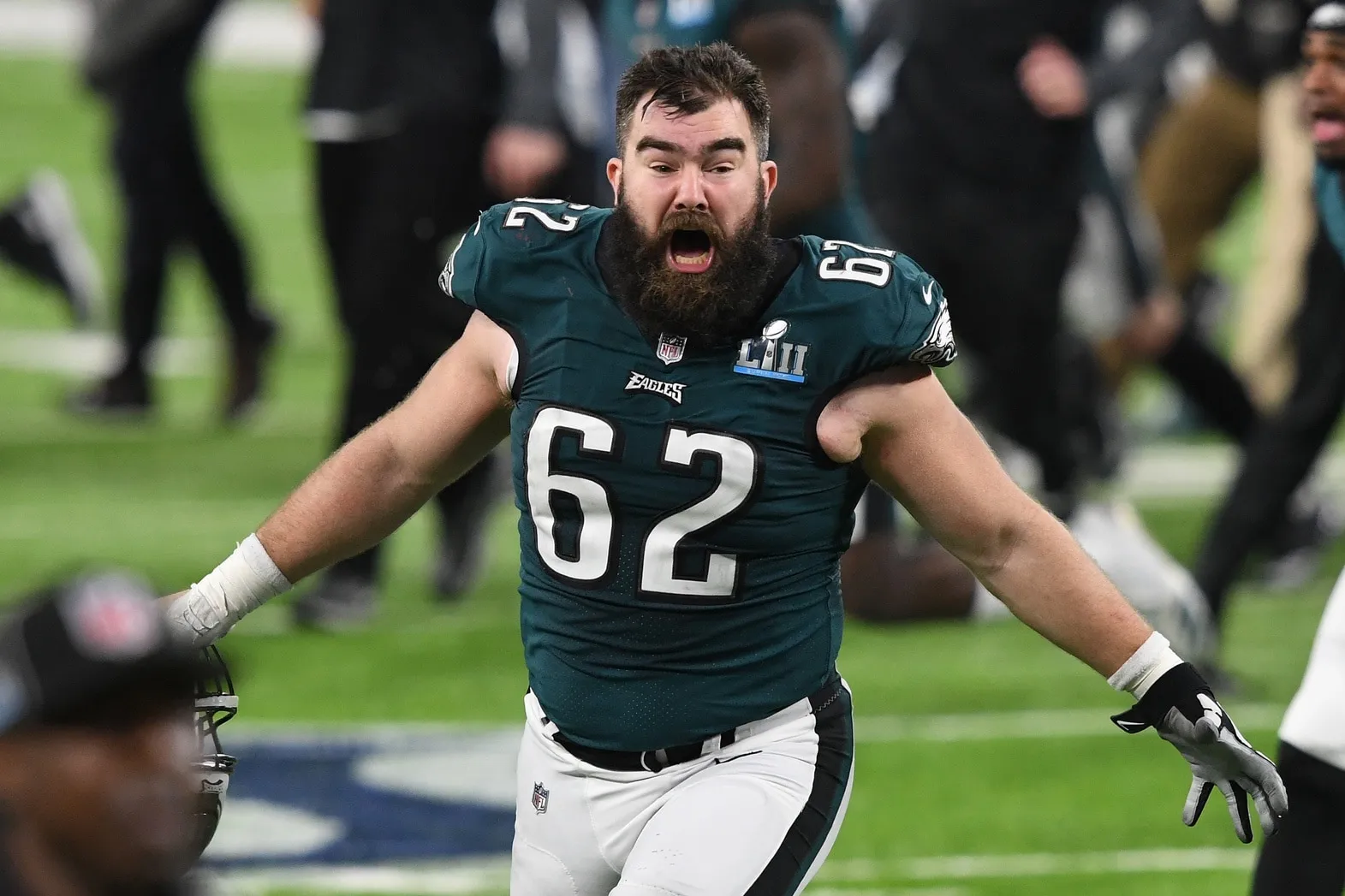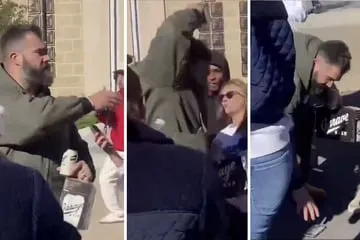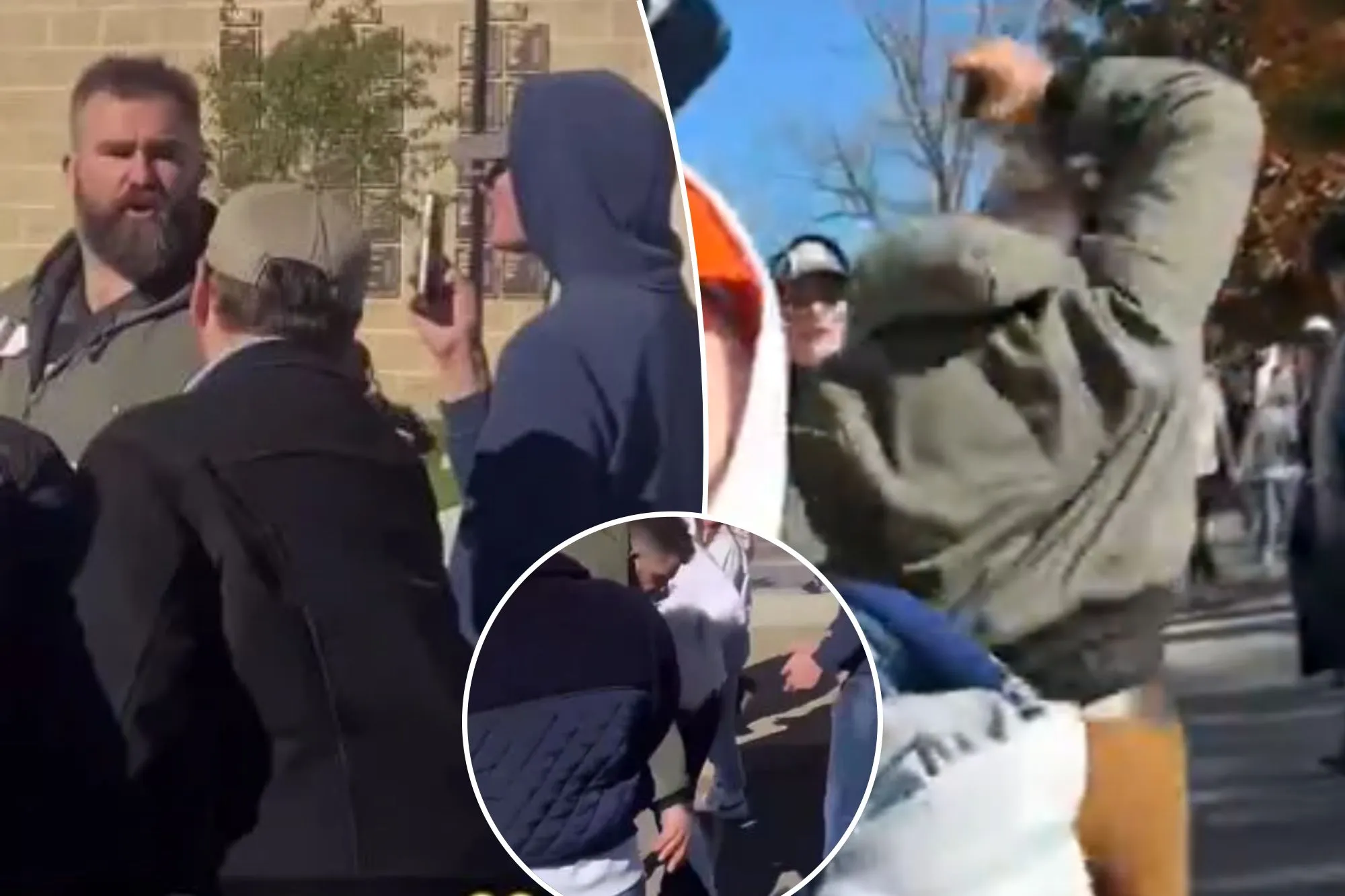Philadelphia Eagles center Jason Kelce, known for his fierce loyalty and unapologetic attitude, recently found himself at the center of a heated controversy after addressing an anti-gay slur directed at his brother, Travis Kelce. When confronted with a hateful comment targeting his sibling, Kelce surprised fans and critics alike by responding with the same derogatory language, sparking a complex discussion on whether such a reaction was warranted or misguided. Kelce, never one to shy away from tough situations, later acknowledged his decision, stating, “I chose to greet hate with hate,” a remark that quickly made headlines and fueled debate across social media.

The incident began when Jason, out with friends, was approached by a fan who used an anti-gay slur aimed at his brother, Travis. Known for his cool-headed demeanor on the field, Jason chose a different approach when confronted with the derogatory language. Rather than ignoring the slur, he mirrored the insult back at the individual in a moment of what he described as “defending my family, my way.” In his words, Jason felt that this response, while unconventional, was an instinctive choice to stand up for his brother in the face of bigotry.
Jason’s reaction has prompted a wide range of responses from fans, fellow athletes, and the general public. Some supporters argue that his actions reflect the raw, emotional bond he shares with his brother and that he was justified in standing his ground. Others, however, have raised concerns about using hateful language in any context, even as a means of defense, suggesting that it could perpetuate harmful stereotypes or inadvertently legitimize such language. This complex reaction highlights the ongoing struggle many face when confronted with hateful comments about those they care for, and it raises questions about what is considered an acceptable or effective form of retaliation.

Kelce, known for his commitment to equality and inclusivity both on and off the field, has long been a vocal supporter of the LGBTQ+ community. In interviews following the incident, he elaborated on his decision, saying, “It wasn’t planned. I reacted. I thought, ‘If this is the language you choose, I’ll respond in the same way so you understand how hurtful it is.’” His words struck a chord with many fans who understand the instinct to defend loved ones, even when it means stepping out of one’s comfort zone or usual approach to conflict. Yet, his method of confronting hate with similar language has divided opinion, with some fans expressing disappointment in his choice.

The incident has also brought attention to the broader conversation about homophobia in sports and public life. While professional sports leagues, including the NFL, have made strides in recent years to promote inclusivity and stand against discrimination, moments like these show that challenges still exist. Fans and followers across social media have weighed in, with some praising Jason’s loyalty to his brother, while others believe he could have responded differently to demonstrate a commitment to inclusivity without reinforcing negative language.
Jason’s reaction and his explanation highlight a delicate balance between defending family and maintaining personal values. Many fans have expressed empathy for the situation, arguing that there’s no single “right” way to react to personal attacks. One social media user commented, “When it comes to family, people react instinctively. Jason stood up for his brother in the heat of the moment—maybe it wasn’t perfect, but it was real.” For many, his reaction embodies the raw emotion that often accompanies public criticism of loved ones, a sentiment that resonates strongly with those who have faced similar situations.
Despite the mixed reactions, Jason has shown no regret for his choice to defend his brother in a way he felt was powerful. He has, however, acknowledged the complexity of his decision, admitting, “Looking back, I understand why people might disagree, but I don’t regret standing up for my brother. We all deal with things differently, and this was my way.” His words demonstrate a deep commitment to protecting his family, even if it means facing criticism from those who feel he could have taken a different approach.

The incident has sparked renewed discussions about the responsibility public figures bear when responding to hate speech. Some argue that celebrities and athletes should always seek to “rise above” and avoid any language that might be construed as harmful, while others believe that these individuals have the right to respond emotionally, especially when family is involved. Jason’s decision to mirror the slur has become a talking point for fans and commentators who continue to discuss the appropriateness and impact of responding to hate with similar language.
Jason Kelce remains focused on his career and responsibilities with the Eagles, but the incident has left a lasting impression on fans who have witnessed the power of his loyalty to his family. Known for his integrity and no-nonsense attitude, Jason’s choice to “greet hate with hate” in this instance has sparked a complex, nuanced conversation on how public figures should handle personal attacks. As social media continues to play an influential role in amplifying the actions of athletes, the incident underscores the challenges of balancing personal values with the expectations of public life.
In the end, Jason Kelce’s actions reflect the strength of familial loyalty and the complexity of navigating public identity as a celebrity. His response, while controversial, serves as a reminder that even the most poised public figures can find themselves faced with decisions in the heat of the moment. As discussions continue, many fans remain in support of Jason’s dedication to his family, believing that his reaction—though unconventional—was an authentic expression of his love and protection for his brother.